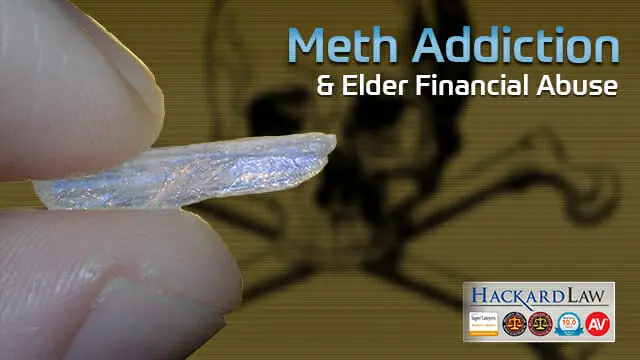
Meth Addiction | Trust, Estate and Elder Financial Abuse Litigation
The 2017 National Survey on Drug Use and Health reported that 1.6 million people related that they had used meth in 2016. Experts report that only 1 in 10 people with addiction receives treatment.
Los Angeles Police Chief Michael Moore conveys that meth is destroying the West Coast. It is now big business for Mexican cartels and U.S. gangs. Brian Hurley, MD, an addiction physician and general psychiatrist at the Los Angeles County Department of Mental Health, says that he often can’t tell whether someone is mentally ill, high on meth or both.
One of the major side effects of meth use is the induction of psychosis. Symptoms of meth psychosis include confusion, delusions, intense paranoia, and visual and auditory hallucinations. So, what do these alarming facts have to do with trust, estate and elder financial abuse litigation?
I’ll explain, but I must step back for a minute. I’ve practiced law for over 40 years. My first estate litigation case was in the late 1970s. A lot has changed since then. And, one of the most disturbing changes is the apparent incidence of meth addiction that I’ve seen in some parties to trust and estate litigation.
While the evidence for the addiction is usually circumstantial, many of the signs of addiction are present. That said, evidence of meth addiction may not be considered relevant to the particular case or may be excluded by a judge in court proceedings. Nevertheless, I believe that meth addiction in parties to estates, trusts and/or elder financial abuse cases can have significant impacts.
Elder financial abuse victims are often defenseless. An elder exploiter, often a family member, who is also a substance abuser, is a potent undue influencer to a vulnerable parent. Couple the family member’s manipulation with meth’s side effects of confusion, delusion, paranoia and hallucinations and there are the makings for ready disaster.
Signs of meth abuse are often evident early in a case. I’ll generalize some examples.
A client describes their sibling:
“He has never worked. He uses drugs. He scares our mother and tells her that she will lose her home if she doesn’t give it to him. Our mom’s house is unkempt, filthy and unsanitary. Large amounts of trash litter every room in the house.”
Parties may be delusional. Paranoia is rampant. Cases can be hard to resolve when one party believes that all of the lawyers, the court and anyone associated with the case are part of a vast conspiracy against them. Such paranoia can also blind the addict to any self-awareness.
The addict’s part in a clearly defined elder financial abuse case is met with absolute denial. Users of “hard drugs like coke, meth or heroin, will deny that they’re loaded till the day they die.”
Innocent parties and lawyers involved in estate, trust and elder financial abuse litigation can benefit by the recognition, when appropriate and justified, that the opposing party’s bizarre conduct is fueled by addiction. Mediation and settlement discussions with such parties are problematical. Knowing this, we know that an actual trial is a greater probability.
And, that’s ok. The delusions of an addict will likely be evident in a trial. And, the addict’s denial of responsibility will be overcome.
Our law firm, Hackard Law, represents out of state and California clients in California Superior Courts, probate and civil, in substantial cases where we think that we can make a significant difference and there is a wrongdoer who can be made financially accountable for their wrongdoing. We focus our geographic practice in California’s largest urban areas, including Los Angeles, Orange, Santa Clara, San Mateo, Alameda, Contra Costa and Sacramento Counties.
If you would like to speak with us about your case, call us at Hackard Law – 916 313-3030. You can also find more information at our website: www.hackardlaw.wpenginepowered.com

 (916) 775-8542
(916) 775-8542